Judge strikes down Florida's anti-trans care ban, citing animus
An appeal to the Eleventh Circuit, which allowed a similar ban in Alabama to go into effect during litigation, is expected.
Florida’s ban on gender-affirming medical care for minors and several of the provisions restricting such care for adults are unconstitutional, a federal judge ruled on Tuesday, finding after trial that animus impermissibly motivated the legislative and administrative actions.
U.S. District Judge Robert Hinkle’s fiery, 105-page ruling is a complete and proper repudiation of the campaign of hate against transgender people employed by Republican Gov. Ron DeSantis and his allies in the legislature and appointees within his administration.
“A majority of unbiased legislators and Board members likely would have concluded there was no legitimate reason to ban gender-affirming care across the board for all minors,” Hinkle found in his ruling, which followed a full trial on the law, passed as S.B. 254, and the actions of the Florida Board of Medicine and Florida Board of Osteopathic Medicine. “The plaintiffs have shown that animus motivated a sufficient number of statutory decisionmakers.”
Hinkle, a Clinton appointee, ruled that the across-the-board ban on puberty blockers and hormone therapy for transgender minors is unconstitutional. He also ruled that several of the restrictions placed on similar care for adults or for minors already receiving care are unconstitutional, including limiting provision of care only to physicians, requiring annual X-rays and bone-density scans and other follow-up care regardless of individualized needs, requiring use of a misleading “informed-consent” form, and limiting mental health assessments to being performed by psychiatrists or psychologists.
Under the judgment in the case, which is a class-action lawsuit, the relevant state and local officials are permanently enjoined from enforcing the unconstitutional provisions against any adults or minors seeking gender-affirming medical care in the form of puberty blockers or hormones.
The ruling does not address surgery, as none of the minor plaintiffs challenged that provision and the remaining adult class representative is not seeking surgery at this time. As such, Hinkle wrote, “This order does not address surgery issues on the merits.”
Hinkle’s ruling is strong, not just for its careful approach to the law and the underlying issues faced by transgender individuals, but also for his refusal to take the case on DeSantis and friends’ terms. Just to give two examples, here is how Hinkle addressed the claim that puberty blockers and hormone therapy for transgender minors are risky:
And here is how he introduced the section addressing the state’s claim that medical organizations that support gender-affirming medical care when appropriate are biased:
Perhaps most important for Tuesday’s ruling is that Hinkle took pains to distinguish his decision from the August 2023 ruling of the U.S. Court of Appeals for the Eleventh Circuit holding that Alabama’s similar ban as to minors is likely constitutional. Because Florida is within the Eleventh Circuit, he is obligated to follow the Eleventh Circuit’s precedents. As discussed below, Hinkle’s ruling primarily distinguished this Florida case, Doe v. Ladapo, his animus finding.
In part because of that ruling in Eknes-Tucker v. Alabama — in addition to Florida’s conservative Republican officials being Florida’s conservative Republican officials — expect a quick appeal from Florida to the Eleventh Circuit.
Hinkle has overseen multiple challenges to anti-transgender actions in Florida. He entered a preliminary injunction in this case back in June 2023, and also ruled against Florida’s ban on Medicaid coverage for gender-affirming care.
Hinkle acknowledged that many aspects of his earlier ruling on the preliminary injunction here would be foreclosed by the Eleventh Circuit’s ruling in the Alabama case. He highlighted, however, that even the Eleventh Circuit’s ruling in Eknes-Tucker noted that the outcome could be different if animus was involved.
“Eknes-Tucker explicitly did not address animus—no claim of animus was presented on the appeal in that case—so the animus issue is open here,” Hinkle wrote. As such, that became a significant part of his findings of fact and, ultimately, conclusions of law in striking down Florida’s ban and several of its restrictions.
In addition, though, Hinkle noted the reality that the status of Eknes-Tucker — and the broader legal landscape in this area — is uncertain.
The plaintiffs in Eknes-Tucker have asked the full Eleventh Circuit to reconsider the three-judge panel’s ruling, and that request has remained pending for months without resolution. Additionally, he noted, petitions seeking U.S. Supreme Court review in other cases challenging similar bans on minors’ care in Tennessee and Kentucky remain pending before the justices.
As such, Hinkle laid out his rulings on other claims — equal protection and parental rights — as well as his finding that he would not even uphold the ban under rational-basis review. At the end of each of those sections, he concluded, “Or so this order would hold absent Eknes-Tucker.”
Ultimately, Hinkle found for the plaintiffs on all over those grounds, as well as on the animus ground.
“There was no showing of animus in Eknes-Tucker or [an Eleventh Circuit case addressing a school’s ban on transgender students using the restroom that matches with their gender identity],” Hinkle wrote. “But there is substantial evidence of animus in the adoption of the statute and rules at issue here.”
Hinkle then spent the next 30 pages detailing the animus motivating the law and policies.
“Some legislators plainly acted from old-fashioned discriminatory animus,” he detailed, noting disturbing and hateful language about transgender people being “mutants” in a House hearing and adding, “Other House members, the Governor, and the Surgeon General have said there is no such thing as transgender identity—that transgender identity is just ideological or made up or wokeism.”
For example, Hinkle quoted a House sponsor of the bill saying, “I can say I’m a porcupine, but that doesn’t make it so.”
He then found:
One of the sponsors also said the “truth is there’s no such thing as someone being able to change their sex.” This completely misunderstands gender identity and shows, quite accurately, that the sponsor does not believe gender identity is real.
This leads to a key point that Hinkle has made in all of his rulings on Florida’s anti-transgender policies, including Tuesday’s ruling. He repeatedly describes it as “the elephant in the room,” but I think, in some ways, that understates its importance. Hinkle stated:
Gender identity is real. The record makes this clear. The defendants, speaking through their attorneys, have admitted it.
This would, in a better world, be the beginning and end of this case. When in a courtroom, there is no there there.
This is more than just an idyllic principle, though. Hinkle laid out how this, when combined with his finding of animus, does legally matter. Noting that the state’s lawyers “explicitly admitted that prohibiting or impeding individuals from pursuing their transgender identities is not a legitimate state interest,” Hinkle wrote that “the record shows beyond any doubt that a significant number of legislators and others involved in the adoption of the statute and rules at issue pursued this admittedly illegitimate interest.”
Which takes us to Hinkle’s purpose, and the reason his ruling is important:
He continued:
It’s a powerful statement of the times in which we live, while nonetheless maintaining hope for a better future.
It’s also a reminder — to us, but also, perhaps, to the judges of the Eleventh Circuit — of the role of courts in the face of such animus.



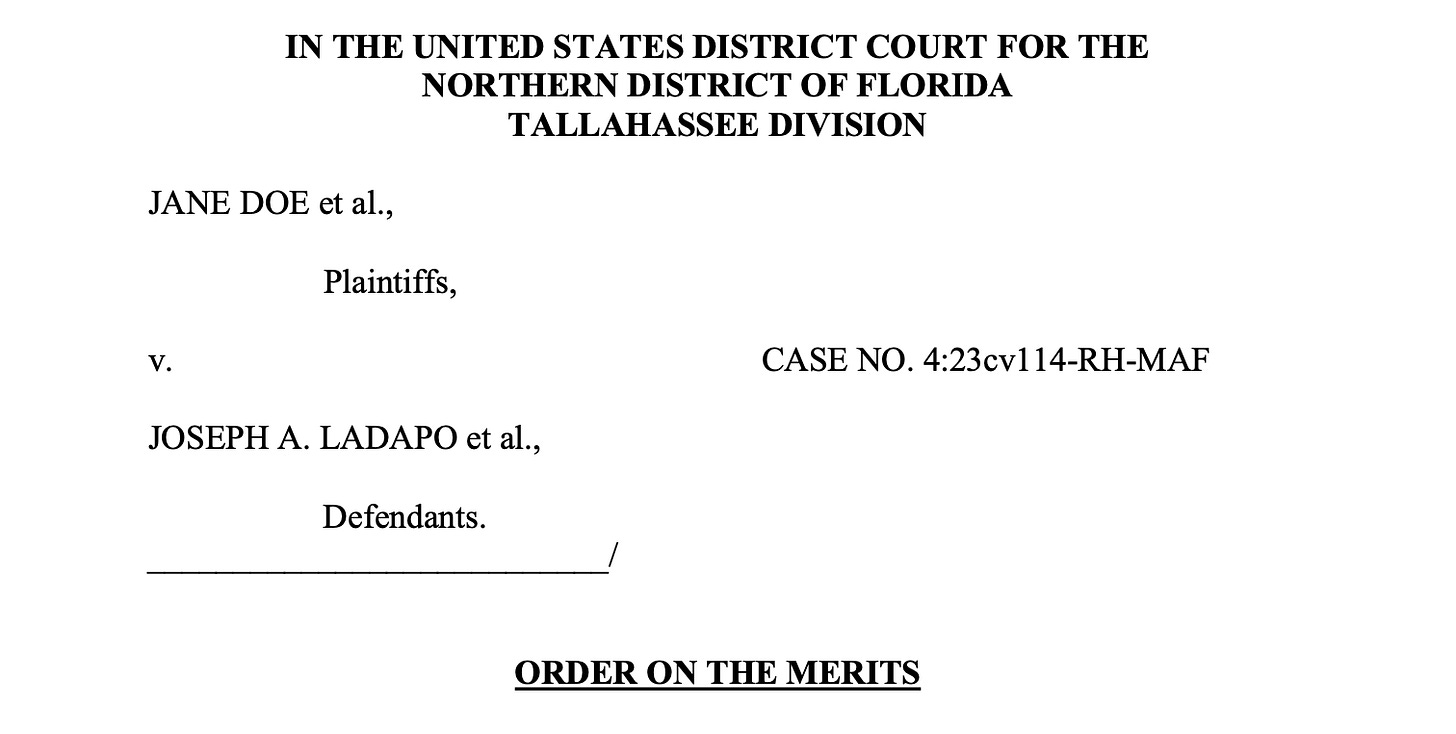
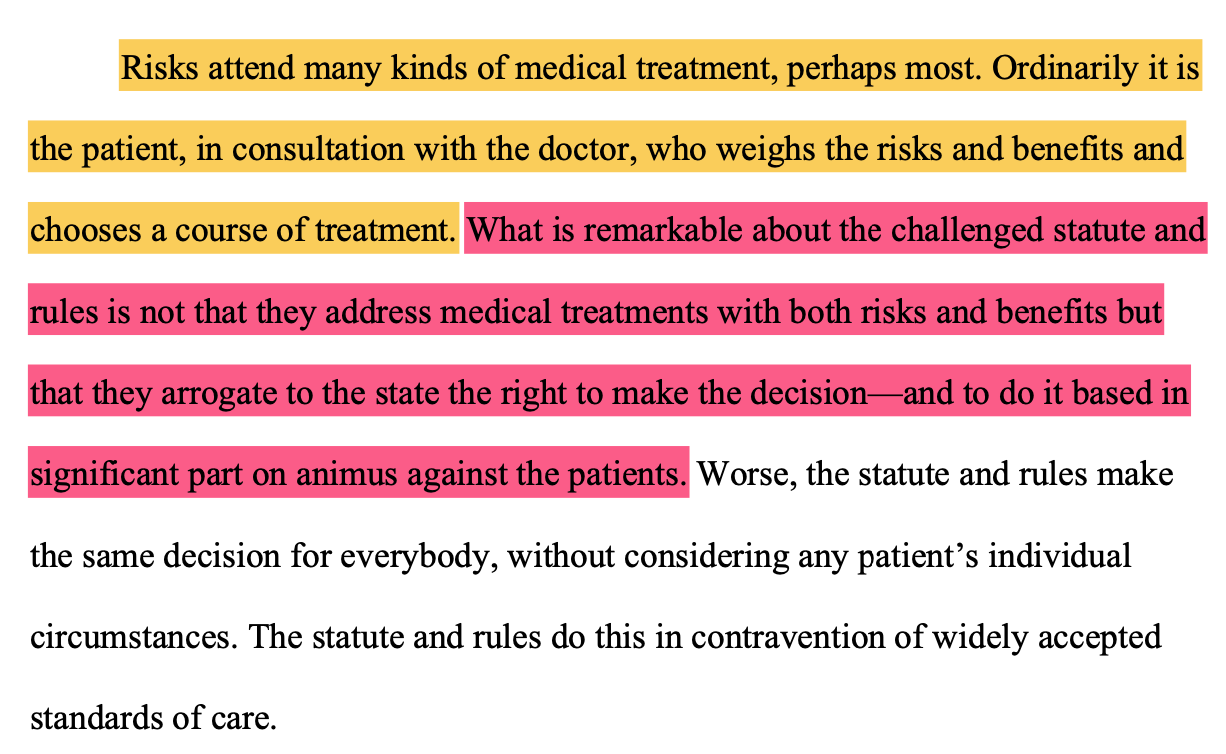
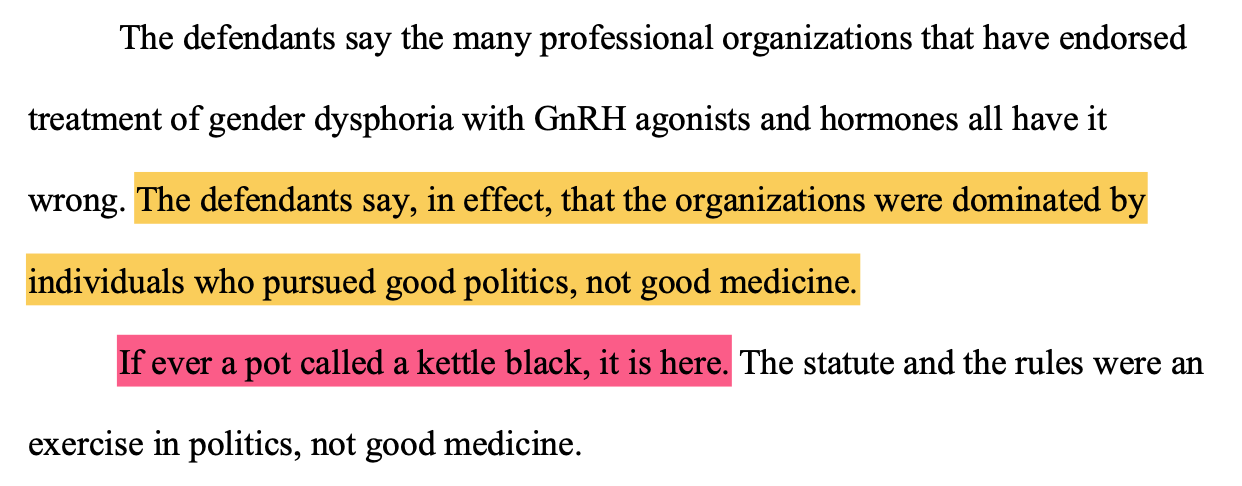
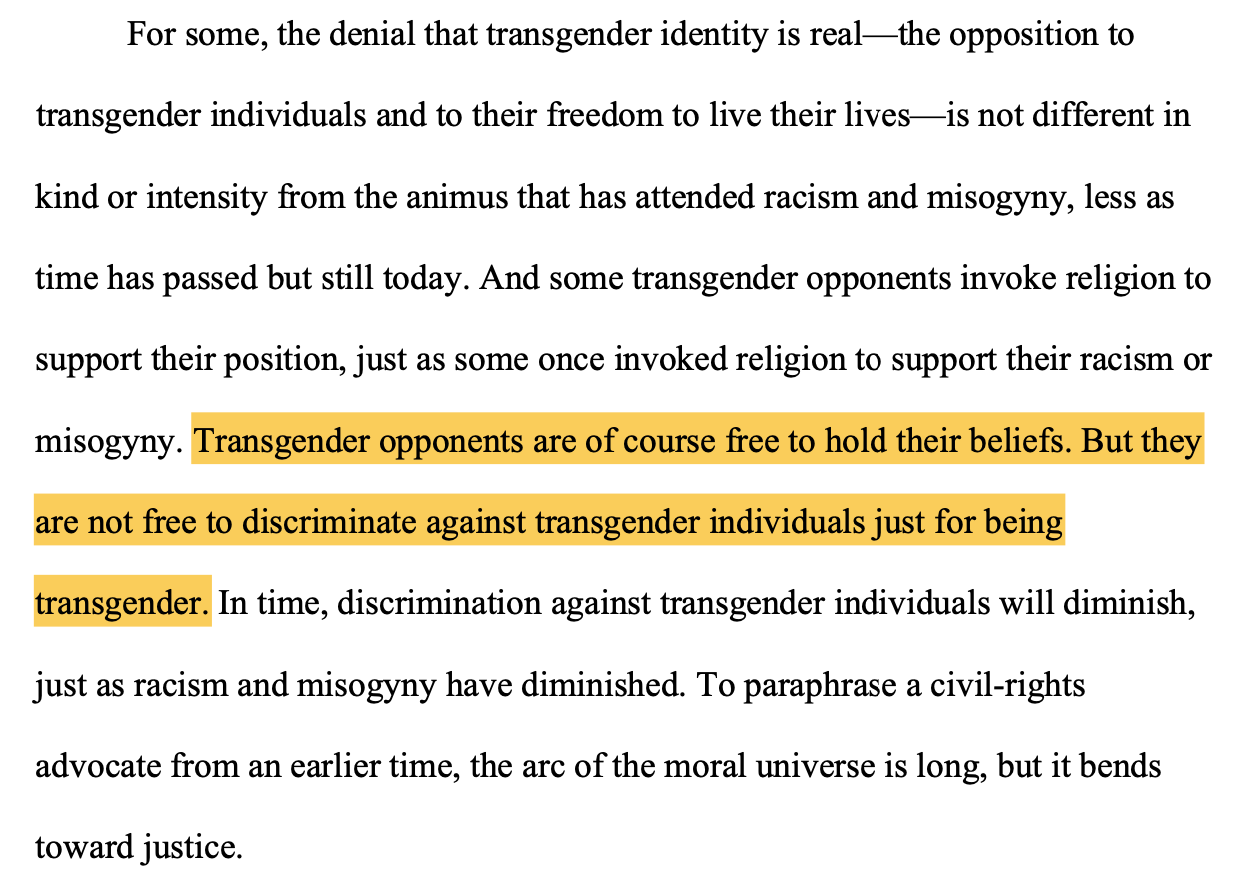
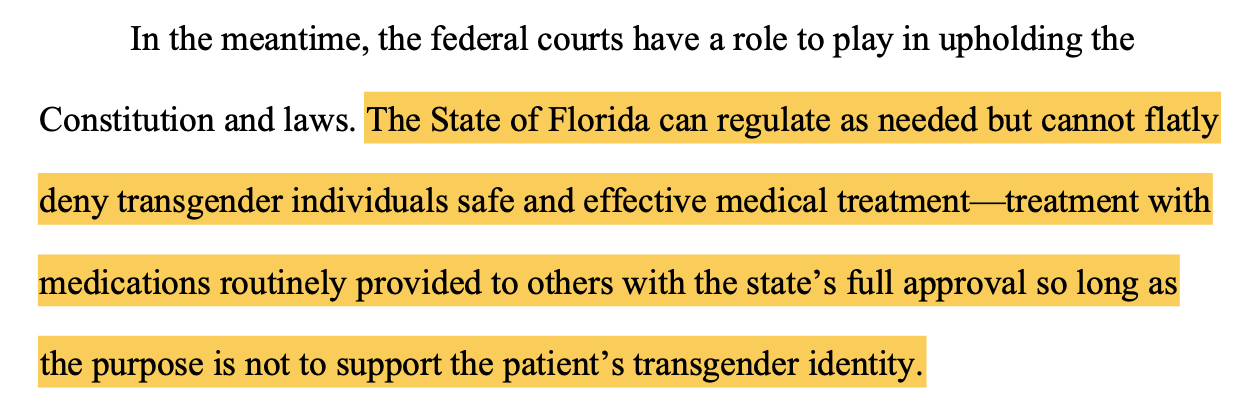
Thank you for the detailed description. It's good to hear a story of a judge ruling to preserve rights and the law. Sadly, this is a clear case where Sen. Durbin's cowardly inability to get past the asinine blue-slip rule will cause pain and suffering for years to come. Red states continue to have empty judgeships that should have been filled by competent judges to dilute the effects of the partisan hacks installed by Cheetolini.
This is fantastic news and a beautifully written argument against what we all know is blatant legislative discrimination. Trans people get called everything from "Satanists" to "imps and demons" and every other insult under the sun during these legislative debates, in more states than just Florida. It's obvious that these laws are fueled by animus, but... ultimately that's what today's Christian conservative policy groups want. They want the "right" (power) to discriminate at will and in legislation, with no penalty or consequence. We cannot give them that power.